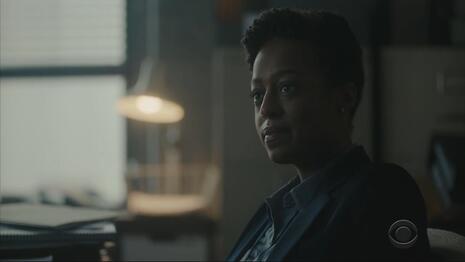 CBS’s latest drama Clarice already promised to insert more social justice politics with a transgender character. Little did we know that the social justice would begin much earlier on another angle. That’s right, the Black Lives Matter narrative managed to sneak its way into The Silence of the Lambs sequel series set in 1993.
CBS’s latest drama Clarice already promised to insert more social justice politics with a transgender character. Little did we know that the social justice would begin much earlier on another angle. That’s right, the Black Lives Matter narrative managed to sneak its way into The Silence of the Lambs sequel series set in 1993.
The March 4 episode “You Can’t Rule Me” has Clarice (Rebecca Breeds) and her team at ViCAP (The Violent Criminal Apprehension Program) being investigated by the FBI after a witness died on their watch in a previous episode. Clarice faces some tension not only from the investigation but also from the fact that she’s being investigated by her close friend, FBI agent Ardelia Mapp (Devyn A. Tyler).
Ordinarily, that would be enough tension on its own, but this is 2021. That means we need to force in a race plot based on the fact that Ardelia is black and in law enforcement. Ardelia herself is lectured on this by a fellow black member of the FBI who reminds her that the Bureau doesn’t highlight “people who look like us.”
Haynes: I'm just trying to say this without embarrassing you. Have you heard about the Black Coalition?
Ardelia: Oh. Yes, I have. The answer's still no. Thank you. I respect deeply what the Coalition is doing, but it's not for me.
Haynes: You aren't interested in your future? You'd have to fight for it, you know? No one can do it alone.
Ardelia: I want to get to a place where I'm not fighting the system -- I'm building a new one.
Haynes: Can you? From inside? "The master's tools --"
Ardelia: "Will never dismantle the master's house." Audre Lorde, 1984. I only make informed decisions, Agent.
Haynes: Cold Cases where you want to be?
Ardelia: I'll make more opportunities in the field. I'll make them.
Haynes: How many times have you requested a transfer? I've been working Security seven years. I have a master's in biology. Every year I put in for a transfer to anyplace for a different detail. The Bureau picks who they wanna shine a light on, and it's not people who look like us.
Ardelia: I need to get back to work.
Haynes: You friend Clarice -- Bureau decided to shine a light on her, and overnight she's a star. Maybe you missed that, being inside and all.
The tension doesn’t go away as Ardelia argues with Clarice who’s undermining the investigation by continuing to pursue a serial killer. Despite the fact that the two are friends, Ardelia isn’t shy to imply that Clarice is guilty of white privilege. “You won't listen because opportunity's like nothing to you. This one goes, another one'll come,” Ardelia vents. When Clarice later apologizes for her behavior, Ardelia just replies, “What's breaking my heart is that you really believe your feelings, your outrage, suddenly makes it all real.”
The show also bends over backwards to prove Ardelia right. We have the stereotypical FBI head who runs a “white boy mafia” and looks down at all the people of color at the Bureau. The episode later shows that he uses Ardelia to purposely cause tension between the FBI and ViCAP only to get back at his white male rival Paul Krendler (Michael Kudlitz). When it comes to storytelling in the BLM era, there’s just no organization that isn’t systemically racist.
Unfortunately, thanks to the activists on TV, all forms of law enforcement must be demonized as racist past, present, and future.
This show was sponsored by commercials from T-Mobile, Geico, and Walgreens.





